Report: Entrepreneurship, Venture Types, and Social Impact Analysis
VerifiedAdded on 2022/11/24
|14
|4097
|1
Report
AI Summary
This report provides a detailed analysis of entrepreneurship and small business management. It begins with an introduction to entrepreneurial ventures, differentiating between various types such as entrepreneurs, serial entrepreneurs, intrapreneurs, and owner-managers. The report then explores the similarities and differences between public and private entrepreneurial ventures. A significant portion is dedicated to interpreting statistics and data to assess the impact of micro and small businesses on a country's economy, including their contributions to GDP, employment, and innovation. The report also examines the importance of start-ups and small businesses in the social economy, highlighting their role in innovation, employment generation, and tax contributions. Furthermore, it delves into the characteristics, traits, and skills that distinguish entrepreneurs from business managers, using Mohsin Issa and Zuber Issa as examples. Finally, the report examines factors that either hinder or foster entrepreneurial relationships, providing a comprehensive overview of the subject.

Entrepreneurship and
Small Business
Management
Small Business
Management
Paraphrase This Document
Need a fresh take? Get an instant paraphrase of this document with our AI Paraphraser
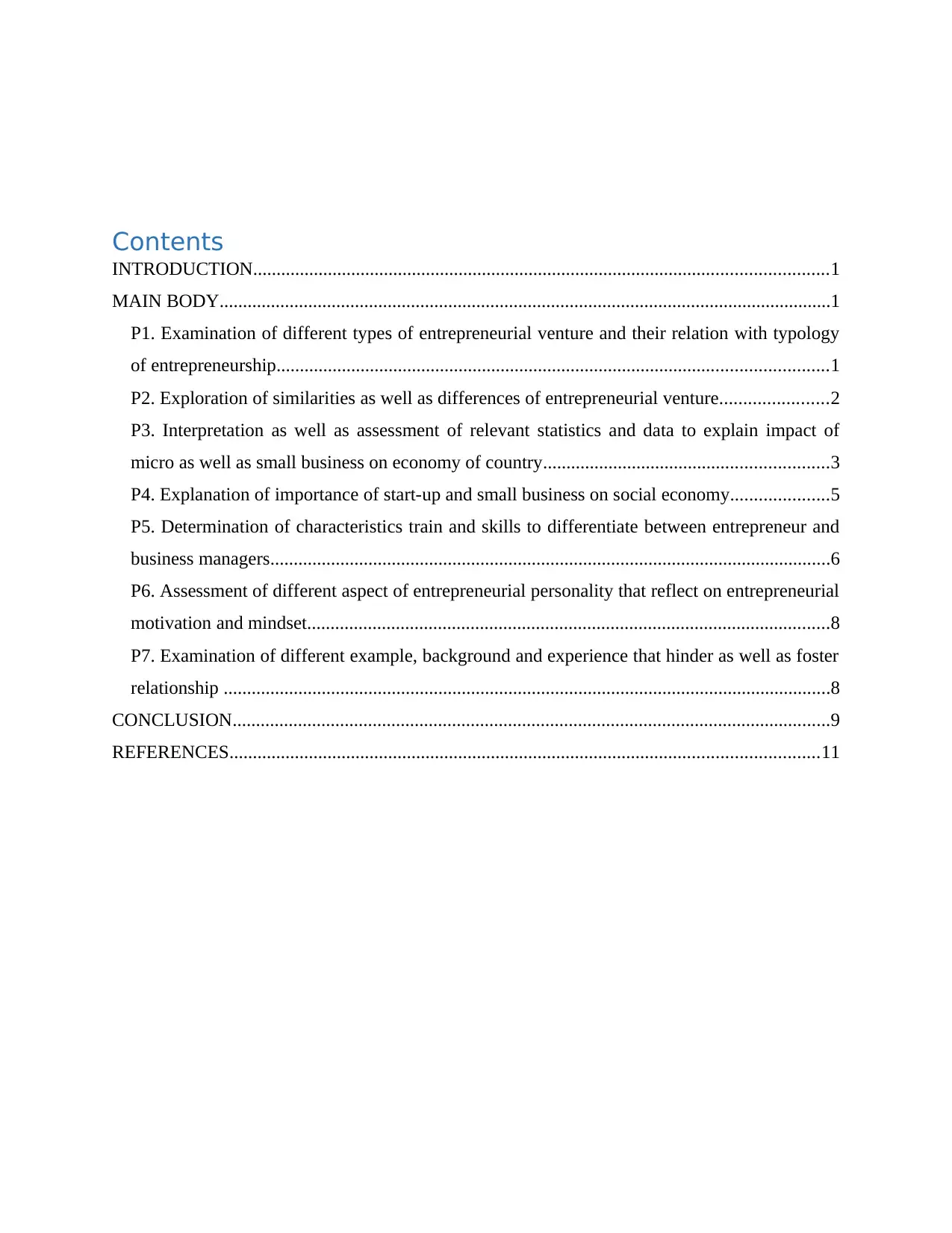
Contents
INTRODUCTION...........................................................................................................................1
MAIN BODY...................................................................................................................................1
P1. Examination of different types of entrepreneurial venture and their relation with typology
of entrepreneurship......................................................................................................................1
P2. Exploration of similarities as well as differences of entrepreneurial venture.......................2
P3. Interpretation as well as assessment of relevant statistics and data to explain impact of
micro as well as small business on economy of country.............................................................3
P4. Explanation of importance of start-up and small business on social economy.....................5
P5. Determination of characteristics train and skills to differentiate between entrepreneur and
business managers........................................................................................................................6
P6. Assessment of different aspect of entrepreneurial personality that reflect on entrepreneurial
motivation and mindset................................................................................................................8
P7. Examination of different example, background and experience that hinder as well as foster
relationship ..................................................................................................................................8
CONCLUSION................................................................................................................................9
REFERENCES..............................................................................................................................11
INTRODUCTION...........................................................................................................................1
MAIN BODY...................................................................................................................................1
P1. Examination of different types of entrepreneurial venture and their relation with typology
of entrepreneurship......................................................................................................................1
P2. Exploration of similarities as well as differences of entrepreneurial venture.......................2
P3. Interpretation as well as assessment of relevant statistics and data to explain impact of
micro as well as small business on economy of country.............................................................3
P4. Explanation of importance of start-up and small business on social economy.....................5
P5. Determination of characteristics train and skills to differentiate between entrepreneur and
business managers........................................................................................................................6
P6. Assessment of different aspect of entrepreneurial personality that reflect on entrepreneurial
motivation and mindset................................................................................................................8
P7. Examination of different example, background and experience that hinder as well as foster
relationship ..................................................................................................................................8
CONCLUSION................................................................................................................................9
REFERENCES..............................................................................................................................11

⊘ This is a preview!⊘
Do you want full access?
Subscribe today to unlock all pages.

Trusted by 1+ million students worldwide
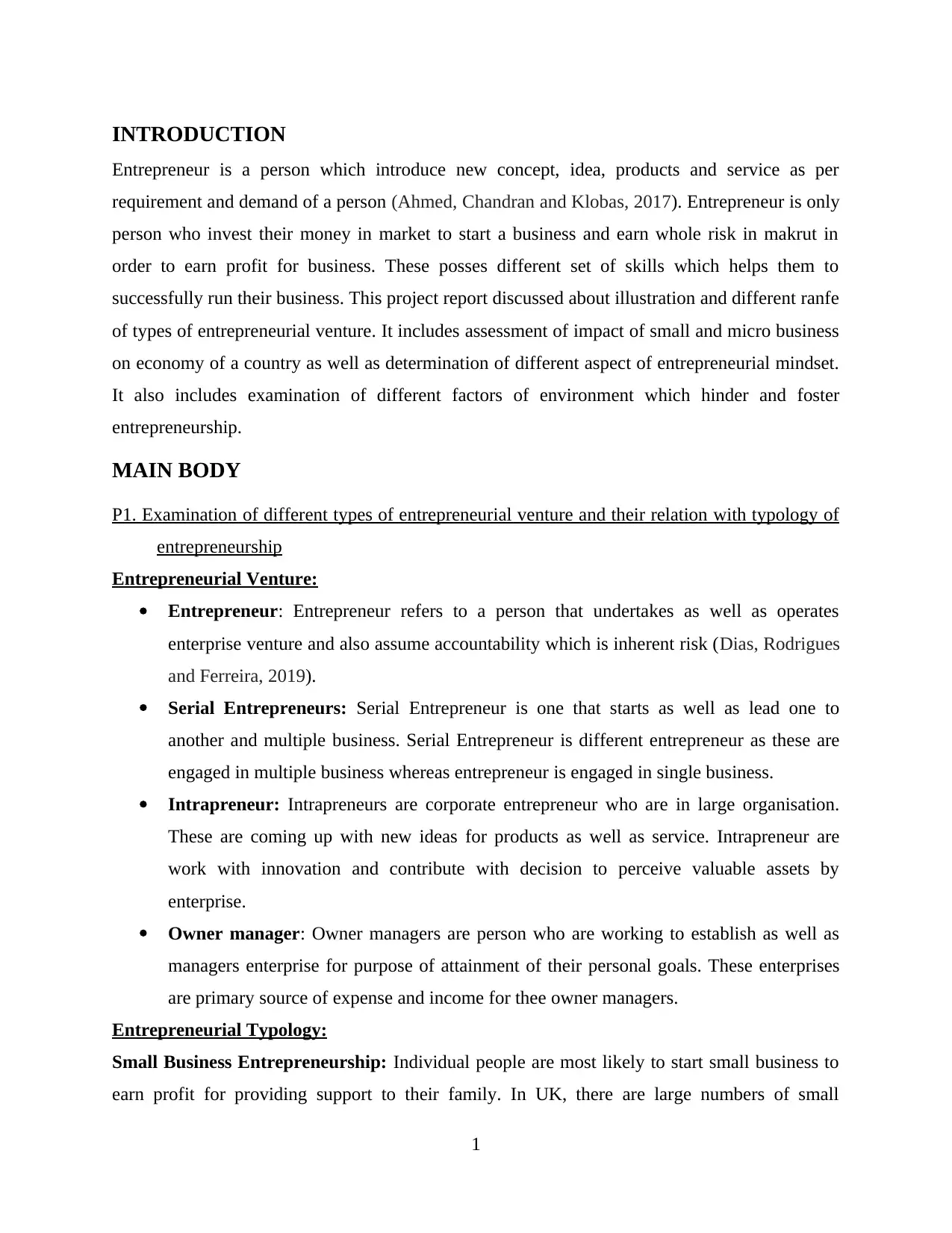
INTRODUCTION
Entrepreneur is a person which introduce new concept, idea, products and service as per
requirement and demand of a person (Ahmed, Chandran and Klobas, 2017). Entrepreneur is only
person who invest their money in market to start a business and earn whole risk in makrut in
order to earn profit for business. These posses different set of skills which helps them to
successfully run their business. This project report discussed about illustration and different ranfe
of types of entrepreneurial venture. It includes assessment of impact of small and micro business
on economy of a country as well as determination of different aspect of entrepreneurial mindset.
It also includes examination of different factors of environment which hinder and foster
entrepreneurship.
MAIN BODY
P1. Examination of different types of entrepreneurial venture and their relation with typology of
entrepreneurship
Entrepreneurial Venture:
Entrepreneur: Entrepreneur refers to a person that undertakes as well as operates
enterprise venture and also assume accountability which is inherent risk (Dias, Rodrigues
and Ferreira, 2019).
Serial Entrepreneurs: Serial Entrepreneur is one that starts as well as lead one to
another and multiple business. Serial Entrepreneur is different entrepreneur as these are
engaged in multiple business whereas entrepreneur is engaged in single business.
Intrapreneur: Intrapreneurs are corporate entrepreneur who are in large organisation.
These are coming up with new ideas for products as well as service. Intrapreneur are
work with innovation and contribute with decision to perceive valuable assets by
enterprise.
Owner manager: Owner managers are person who are working to establish as well as
managers enterprise for purpose of attainment of their personal goals. These enterprises
are primary source of expense and income for thee owner managers.
Entrepreneurial Typology:
Small Business Entrepreneurship: Individual people are most likely to start small business to
earn profit for providing support to their family. In UK, there are large numbers of small
1
Entrepreneur is a person which introduce new concept, idea, products and service as per
requirement and demand of a person (Ahmed, Chandran and Klobas, 2017). Entrepreneur is only
person who invest their money in market to start a business and earn whole risk in makrut in
order to earn profit for business. These posses different set of skills which helps them to
successfully run their business. This project report discussed about illustration and different ranfe
of types of entrepreneurial venture. It includes assessment of impact of small and micro business
on economy of a country as well as determination of different aspect of entrepreneurial mindset.
It also includes examination of different factors of environment which hinder and foster
entrepreneurship.
MAIN BODY
P1. Examination of different types of entrepreneurial venture and their relation with typology of
entrepreneurship
Entrepreneurial Venture:
Entrepreneur: Entrepreneur refers to a person that undertakes as well as operates
enterprise venture and also assume accountability which is inherent risk (Dias, Rodrigues
and Ferreira, 2019).
Serial Entrepreneurs: Serial Entrepreneur is one that starts as well as lead one to
another and multiple business. Serial Entrepreneur is different entrepreneur as these are
engaged in multiple business whereas entrepreneur is engaged in single business.
Intrapreneur: Intrapreneurs are corporate entrepreneur who are in large organisation.
These are coming up with new ideas for products as well as service. Intrapreneur are
work with innovation and contribute with decision to perceive valuable assets by
enterprise.
Owner manager: Owner managers are person who are working to establish as well as
managers enterprise for purpose of attainment of their personal goals. These enterprises
are primary source of expense and income for thee owner managers.
Entrepreneurial Typology:
Small Business Entrepreneurship: Individual people are most likely to start small business to
earn profit for providing support to their family. In UK, there are large numbers of small
1
Paraphrase This Document
Need a fresh take? Get an instant paraphrase of this document with our AI Paraphraser
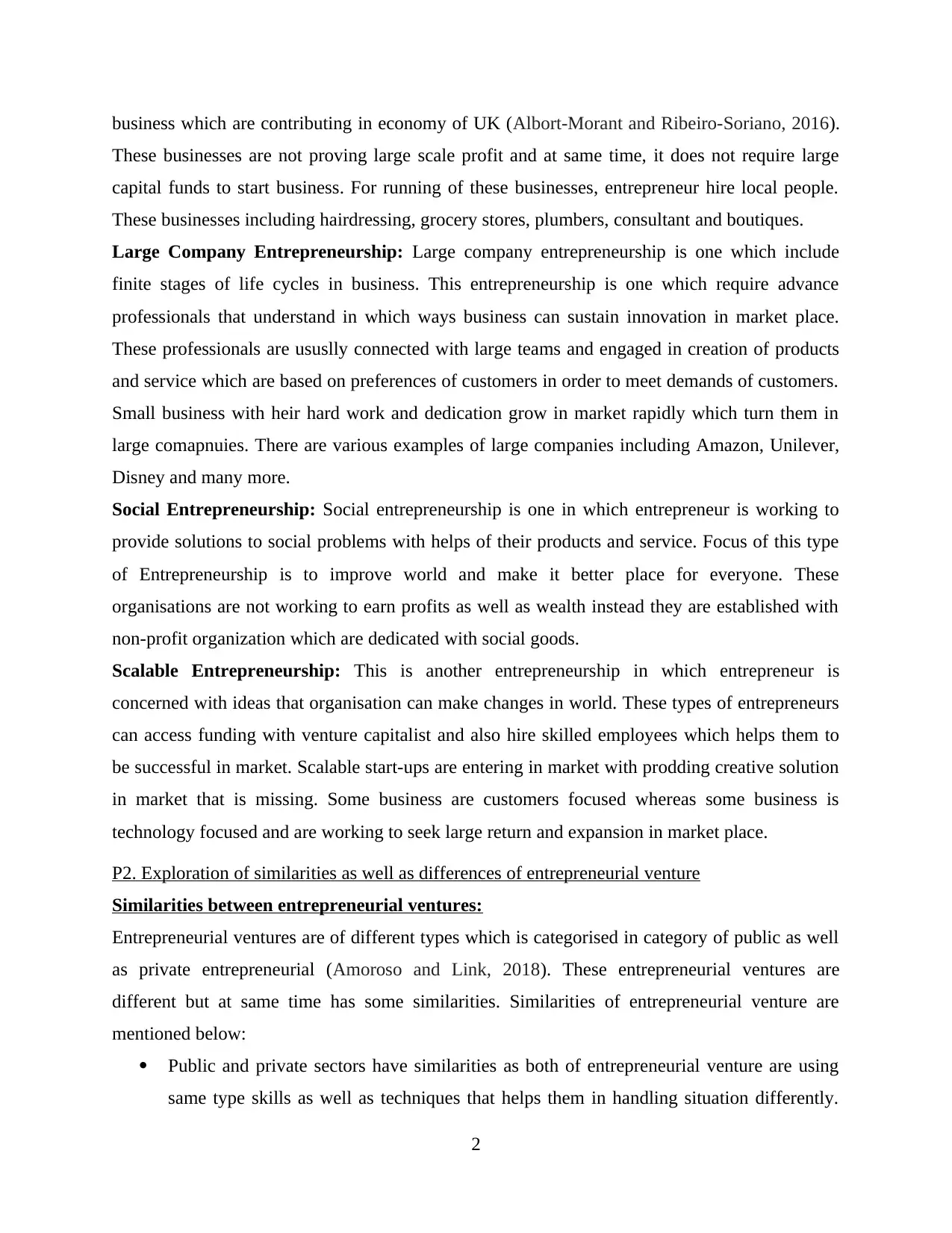
business which are contributing in economy of UK (Albort-Morant and Ribeiro-Soriano, 2016).
These businesses are not proving large scale profit and at same time, it does not require large
capital funds to start business. For running of these businesses, entrepreneur hire local people.
These businesses including hairdressing, grocery stores, plumbers, consultant and boutiques.
Large Company Entrepreneurship: Large company entrepreneurship is one which include
finite stages of life cycles in business. This entrepreneurship is one which require advance
professionals that understand in which ways business can sustain innovation in market place.
These professionals are ususlly connected with large teams and engaged in creation of products
and service which are based on preferences of customers in order to meet demands of customers.
Small business with heir hard work and dedication grow in market rapidly which turn them in
large comapnuies. There are various examples of large companies including Amazon, Unilever,
Disney and many more.
Social Entrepreneurship: Social entrepreneurship is one in which entrepreneur is working to
provide solutions to social problems with helps of their products and service. Focus of this type
of Entrepreneurship is to improve world and make it better place for everyone. These
organisations are not working to earn profits as well as wealth instead they are established with
non-profit organization which are dedicated with social goods.
Scalable Entrepreneurship: This is another entrepreneurship in which entrepreneur is
concerned with ideas that organisation can make changes in world. These types of entrepreneurs
can access funding with venture capitalist and also hire skilled employees which helps them to
be successful in market. Scalable start-ups are entering in market with prodding creative solution
in market that is missing. Some business are customers focused whereas some business is
technology focused and are working to seek large return and expansion in market place.
P2. Exploration of similarities as well as differences of entrepreneurial venture
Similarities between entrepreneurial ventures:
Entrepreneurial ventures are of different types which is categorised in category of public as well
as private entrepreneurial (Amoroso and Link, 2018). These entrepreneurial ventures are
different but at same time has some similarities. Similarities of entrepreneurial venture are
mentioned below:
Public and private sectors have similarities as both of entrepreneurial venture are using
same type skills as well as techniques that helps them in handling situation differently.
2
These businesses are not proving large scale profit and at same time, it does not require large
capital funds to start business. For running of these businesses, entrepreneur hire local people.
These businesses including hairdressing, grocery stores, plumbers, consultant and boutiques.
Large Company Entrepreneurship: Large company entrepreneurship is one which include
finite stages of life cycles in business. This entrepreneurship is one which require advance
professionals that understand in which ways business can sustain innovation in market place.
These professionals are ususlly connected with large teams and engaged in creation of products
and service which are based on preferences of customers in order to meet demands of customers.
Small business with heir hard work and dedication grow in market rapidly which turn them in
large comapnuies. There are various examples of large companies including Amazon, Unilever,
Disney and many more.
Social Entrepreneurship: Social entrepreneurship is one in which entrepreneur is working to
provide solutions to social problems with helps of their products and service. Focus of this type
of Entrepreneurship is to improve world and make it better place for everyone. These
organisations are not working to earn profits as well as wealth instead they are established with
non-profit organization which are dedicated with social goods.
Scalable Entrepreneurship: This is another entrepreneurship in which entrepreneur is
concerned with ideas that organisation can make changes in world. These types of entrepreneurs
can access funding with venture capitalist and also hire skilled employees which helps them to
be successful in market. Scalable start-ups are entering in market with prodding creative solution
in market that is missing. Some business are customers focused whereas some business is
technology focused and are working to seek large return and expansion in market place.
P2. Exploration of similarities as well as differences of entrepreneurial venture
Similarities between entrepreneurial ventures:
Entrepreneurial ventures are of different types which is categorised in category of public as well
as private entrepreneurial (Amoroso and Link, 2018). These entrepreneurial ventures are
different but at same time has some similarities. Similarities of entrepreneurial venture are
mentioned below:
Public and private sectors have similarities as both of entrepreneurial venture are using
same type skills as well as techniques that helps them in handling situation differently.
2
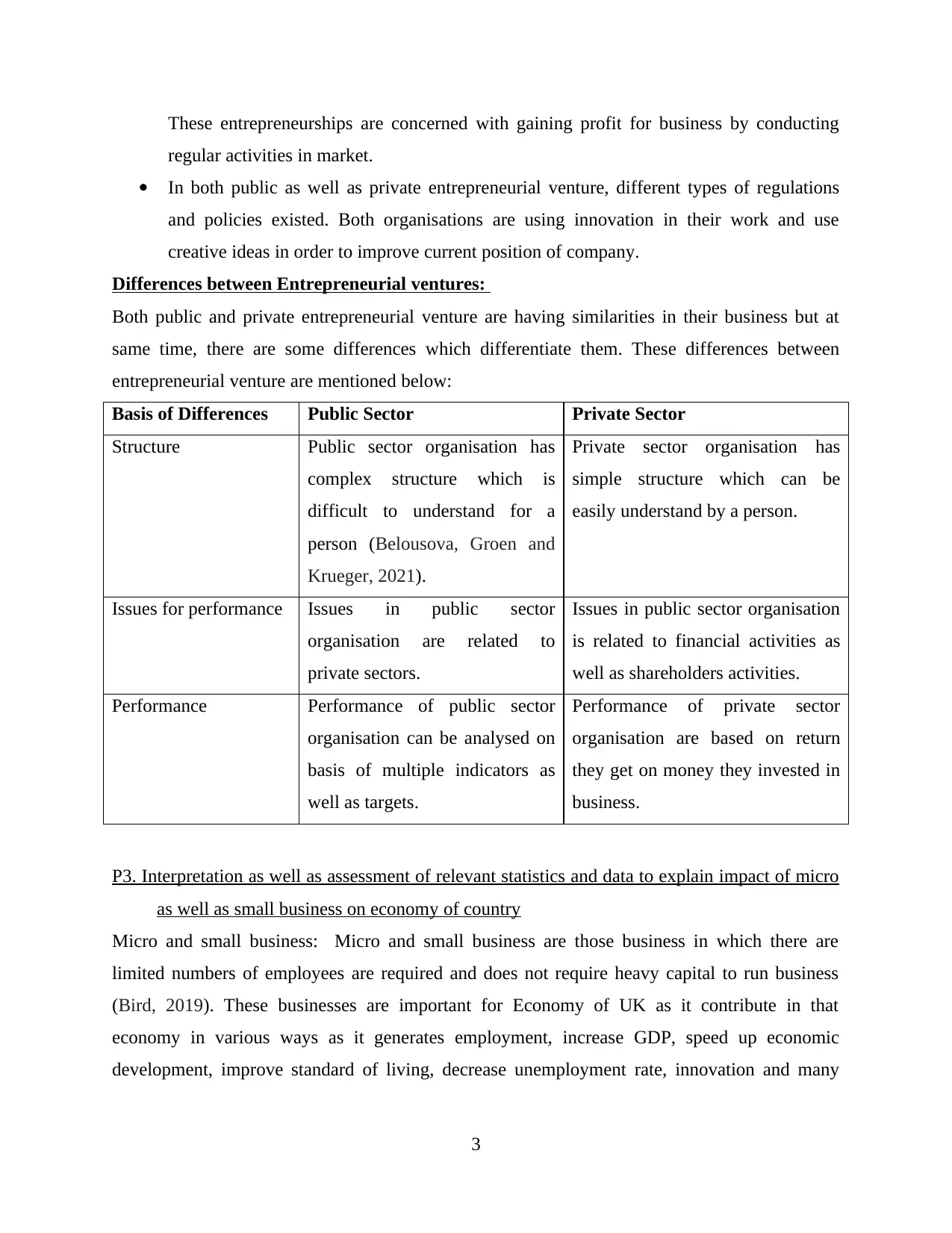
These entrepreneurships are concerned with gaining profit for business by conducting
regular activities in market.
In both public as well as private entrepreneurial venture, different types of regulations
and policies existed. Both organisations are using innovation in their work and use
creative ideas in order to improve current position of company.
Differences between Entrepreneurial ventures:
Both public and private entrepreneurial venture are having similarities in their business but at
same time, there are some differences which differentiate them. These differences between
entrepreneurial venture are mentioned below:
Basis of Differences Public Sector Private Sector
Structure Public sector organisation has
complex structure which is
difficult to understand for a
person (Belousova, Groen and
Krueger, 2021).
Private sector organisation has
simple structure which can be
easily understand by a person.
Issues for performance Issues in public sector
organisation are related to
private sectors.
Issues in public sector organisation
is related to financial activities as
well as shareholders activities.
Performance Performance of public sector
organisation can be analysed on
basis of multiple indicators as
well as targets.
Performance of private sector
organisation are based on return
they get on money they invested in
business.
P3. Interpretation as well as assessment of relevant statistics and data to explain impact of micro
as well as small business on economy of country
Micro and small business: Micro and small business are those business in which there are
limited numbers of employees are required and does not require heavy capital to run business
(Bird, 2019). These businesses are important for Economy of UK as it contribute in that
economy in various ways as it generates employment, increase GDP, speed up economic
development, improve standard of living, decrease unemployment rate, innovation and many
3
regular activities in market.
In both public as well as private entrepreneurial venture, different types of regulations
and policies existed. Both organisations are using innovation in their work and use
creative ideas in order to improve current position of company.
Differences between Entrepreneurial ventures:
Both public and private entrepreneurial venture are having similarities in their business but at
same time, there are some differences which differentiate them. These differences between
entrepreneurial venture are mentioned below:
Basis of Differences Public Sector Private Sector
Structure Public sector organisation has
complex structure which is
difficult to understand for a
person (Belousova, Groen and
Krueger, 2021).
Private sector organisation has
simple structure which can be
easily understand by a person.
Issues for performance Issues in public sector
organisation are related to
private sectors.
Issues in public sector organisation
is related to financial activities as
well as shareholders activities.
Performance Performance of public sector
organisation can be analysed on
basis of multiple indicators as
well as targets.
Performance of private sector
organisation are based on return
they get on money they invested in
business.
P3. Interpretation as well as assessment of relevant statistics and data to explain impact of micro
as well as small business on economy of country
Micro and small business: Micro and small business are those business in which there are
limited numbers of employees are required and does not require heavy capital to run business
(Bird, 2019). These businesses are important for Economy of UK as it contribute in that
economy in various ways as it generates employment, increase GDP, speed up economic
development, improve standard of living, decrease unemployment rate, innovation and many
3
⊘ This is a preview!⊘
Do you want full access?
Subscribe today to unlock all pages.

Trusted by 1+ million students worldwide
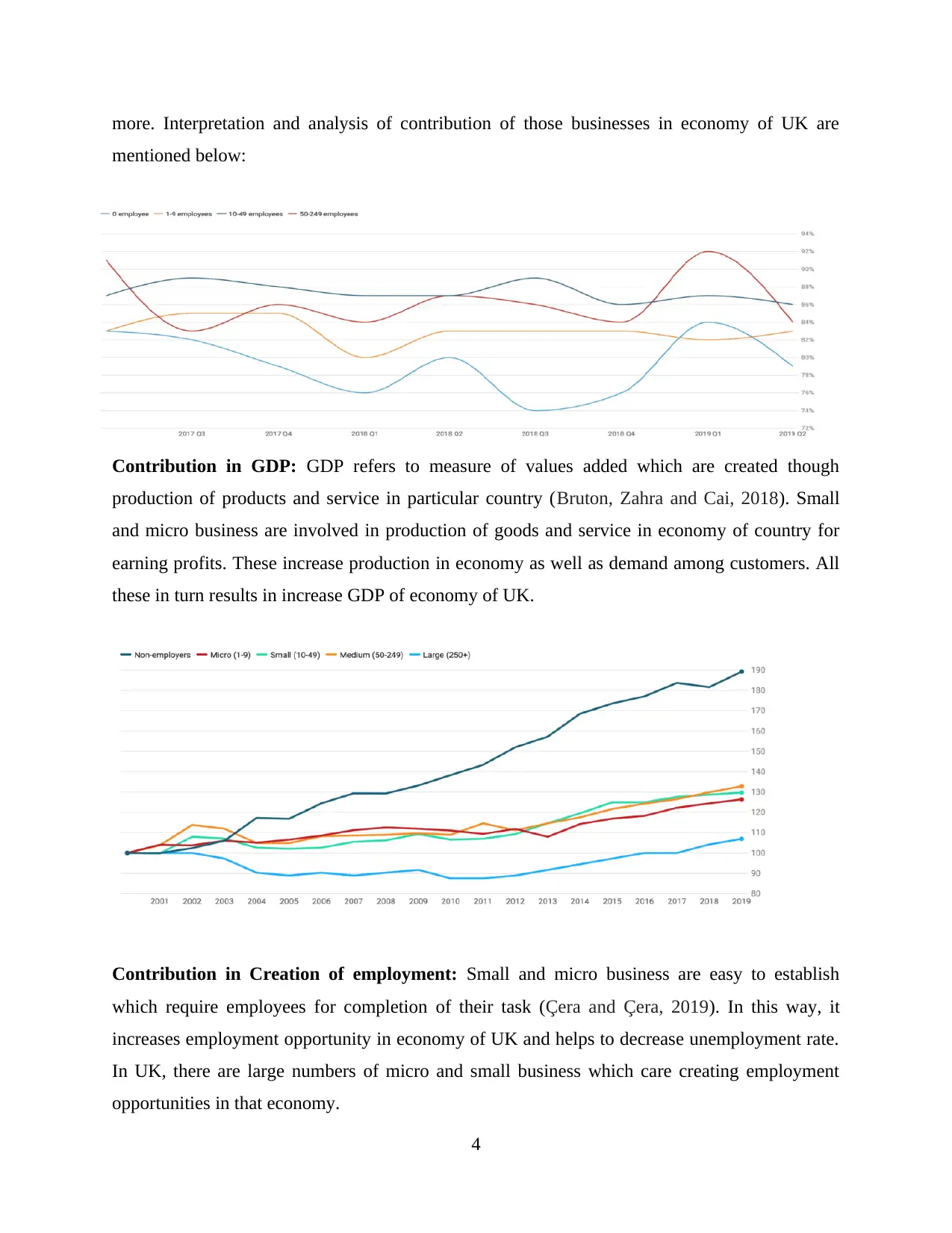
more. Interpretation and analysis of contribution of those businesses in economy of UK are
mentioned below:
Contribution in GDP: GDP refers to measure of values added which are created though
production of products and service in particular country (Bruton, Zahra and Cai, 2018). Small
and micro business are involved in production of goods and service in economy of country for
earning profits. These increase production in economy as well as demand among customers. All
these in turn results in increase GDP of economy of UK.
Contribution in Creation of employment: Small and micro business are easy to establish
which require employees for completion of their task (Çera and Çera, 2019). In this way, it
increases employment opportunity in economy of UK and helps to decrease unemployment rate.
In UK, there are large numbers of micro and small business which care creating employment
opportunities in that economy.
4
mentioned below:
Contribution in GDP: GDP refers to measure of values added which are created though
production of products and service in particular country (Bruton, Zahra and Cai, 2018). Small
and micro business are involved in production of goods and service in economy of country for
earning profits. These increase production in economy as well as demand among customers. All
these in turn results in increase GDP of economy of UK.
Contribution in Creation of employment: Small and micro business are easy to establish
which require employees for completion of their task (Çera and Çera, 2019). In this way, it
increases employment opportunity in economy of UK and helps to decrease unemployment rate.
In UK, there are large numbers of micro and small business which care creating employment
opportunities in that economy.
4
Paraphrase This Document
Need a fresh take? Get an instant paraphrase of this document with our AI Paraphraser
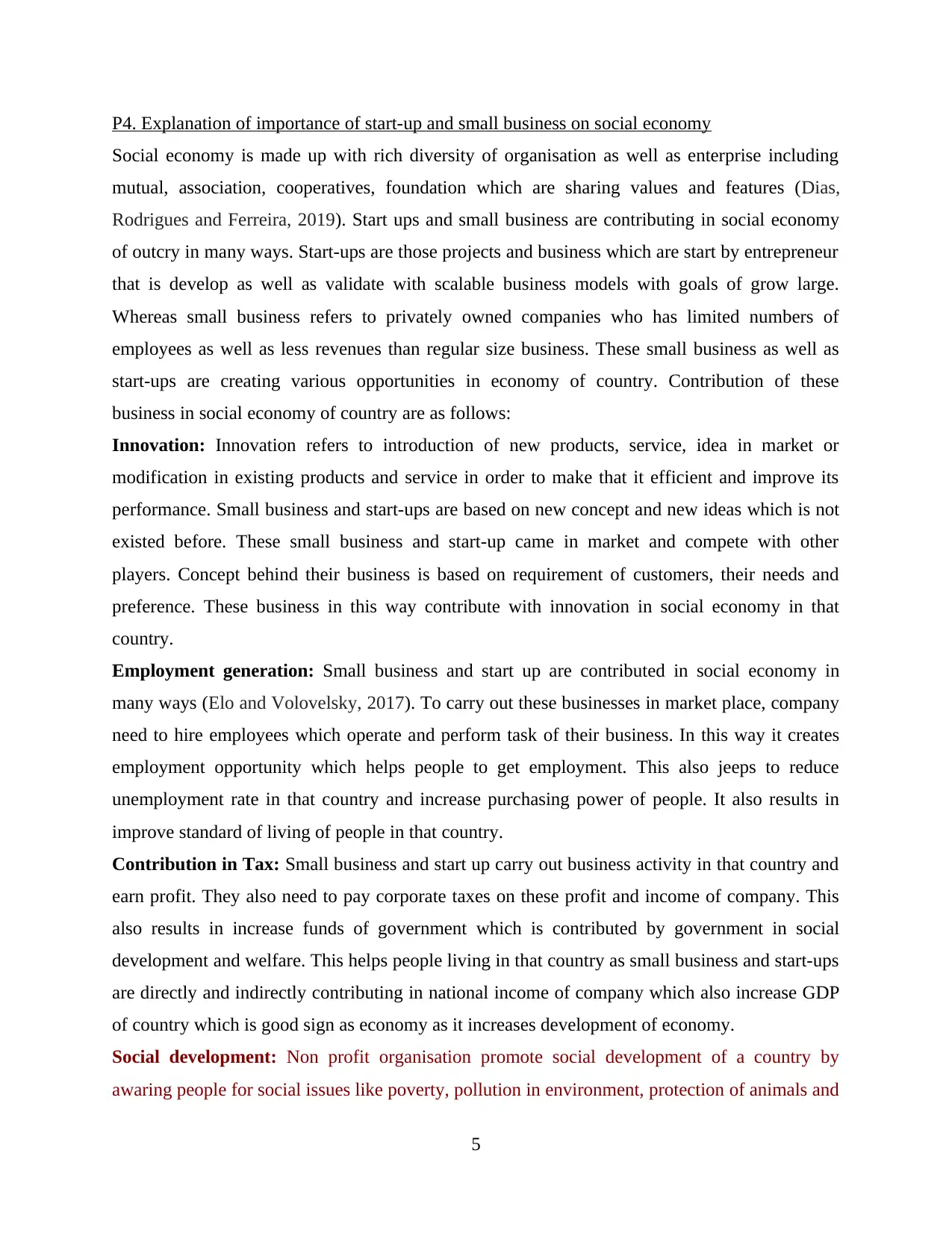
P4. Explanation of importance of start-up and small business on social economy
Social economy is made up with rich diversity of organisation as well as enterprise including
mutual, association, cooperatives, foundation which are sharing values and features (Dias,
Rodrigues and Ferreira, 2019). Start ups and small business are contributing in social economy
of outcry in many ways. Start-ups are those projects and business which are start by entrepreneur
that is develop as well as validate with scalable business models with goals of grow large.
Whereas small business refers to privately owned companies who has limited numbers of
employees as well as less revenues than regular size business. These small business as well as
start-ups are creating various opportunities in economy of country. Contribution of these
business in social economy of country are as follows:
Innovation: Innovation refers to introduction of new products, service, idea in market or
modification in existing products and service in order to make that it efficient and improve its
performance. Small business and start-ups are based on new concept and new ideas which is not
existed before. These small business and start-up came in market and compete with other
players. Concept behind their business is based on requirement of customers, their needs and
preference. These business in this way contribute with innovation in social economy in that
country.
Employment generation: Small business and start up are contributed in social economy in
many ways (Elo and Volovelsky, 2017). To carry out these businesses in market place, company
need to hire employees which operate and perform task of their business. In this way it creates
employment opportunity which helps people to get employment. This also jeeps to reduce
unemployment rate in that country and increase purchasing power of people. It also results in
improve standard of living of people in that country.
Contribution in Tax: Small business and start up carry out business activity in that country and
earn profit. They also need to pay corporate taxes on these profit and income of company. This
also results in increase funds of government which is contributed by government in social
development and welfare. This helps people living in that country as small business and start-ups
are directly and indirectly contributing in national income of company which also increase GDP
of country which is good sign as economy as it increases development of economy.
Social development: Non profit organisation promote social development of a country by
awaring people for social issues like poverty, pollution in environment, protection of animals and
5
Social economy is made up with rich diversity of organisation as well as enterprise including
mutual, association, cooperatives, foundation which are sharing values and features (Dias,
Rodrigues and Ferreira, 2019). Start ups and small business are contributing in social economy
of outcry in many ways. Start-ups are those projects and business which are start by entrepreneur
that is develop as well as validate with scalable business models with goals of grow large.
Whereas small business refers to privately owned companies who has limited numbers of
employees as well as less revenues than regular size business. These small business as well as
start-ups are creating various opportunities in economy of country. Contribution of these
business in social economy of country are as follows:
Innovation: Innovation refers to introduction of new products, service, idea in market or
modification in existing products and service in order to make that it efficient and improve its
performance. Small business and start-ups are based on new concept and new ideas which is not
existed before. These small business and start-up came in market and compete with other
players. Concept behind their business is based on requirement of customers, their needs and
preference. These business in this way contribute with innovation in social economy in that
country.
Employment generation: Small business and start up are contributed in social economy in
many ways (Elo and Volovelsky, 2017). To carry out these businesses in market place, company
need to hire employees which operate and perform task of their business. In this way it creates
employment opportunity which helps people to get employment. This also jeeps to reduce
unemployment rate in that country and increase purchasing power of people. It also results in
improve standard of living of people in that country.
Contribution in Tax: Small business and start up carry out business activity in that country and
earn profit. They also need to pay corporate taxes on these profit and income of company. This
also results in increase funds of government which is contributed by government in social
development and welfare. This helps people living in that country as small business and start-ups
are directly and indirectly contributing in national income of company which also increase GDP
of country which is good sign as economy as it increases development of economy.
Social development: Non profit organisation promote social development of a country by
awaring people for social issues like poverty, pollution in environment, protection of animals and
5
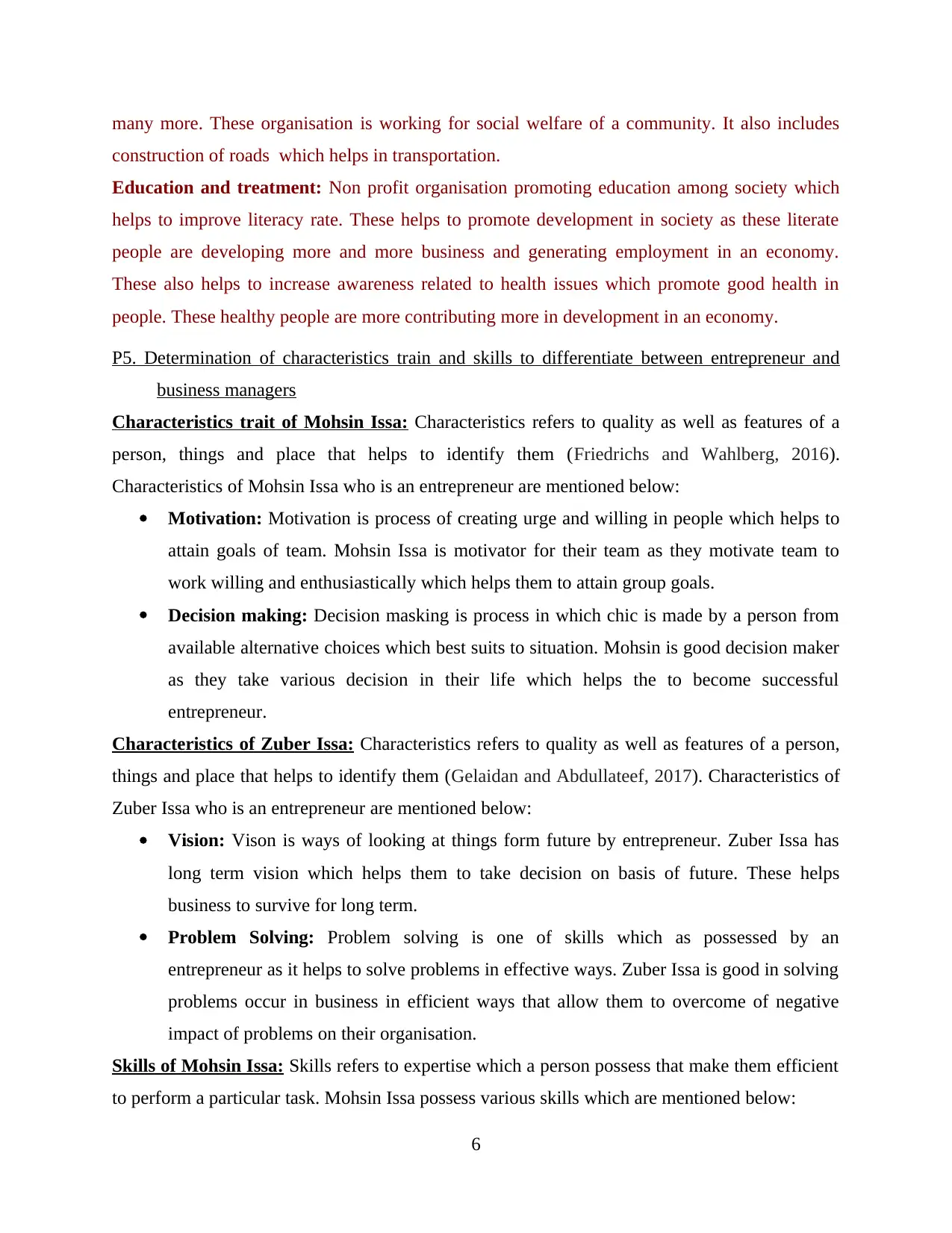
many more. These organisation is working for social welfare of a community. It also includes
construction of roads which helps in transportation.
Education and treatment: Non profit organisation promoting education among society which
helps to improve literacy rate. These helps to promote development in society as these literate
people are developing more and more business and generating employment in an economy.
These also helps to increase awareness related to health issues which promote good health in
people. These healthy people are more contributing more in development in an economy.
P5. Determination of characteristics train and skills to differentiate between entrepreneur and
business managers
Characteristics trait of Mohsin Issa: Characteristics refers to quality as well as features of a
person, things and place that helps to identify them (Friedrichs and Wahlberg, 2016).
Characteristics of Mohsin Issa who is an entrepreneur are mentioned below:
Motivation: Motivation is process of creating urge and willing in people which helps to
attain goals of team. Mohsin Issa is motivator for their team as they motivate team to
work willing and enthusiastically which helps them to attain group goals.
Decision making: Decision masking is process in which chic is made by a person from
available alternative choices which best suits to situation. Mohsin is good decision maker
as they take various decision in their life which helps the to become successful
entrepreneur.
Characteristics of Zuber Issa: Characteristics refers to quality as well as features of a person,
things and place that helps to identify them (Gelaidan and Abdullateef, 2017). Characteristics of
Zuber Issa who is an entrepreneur are mentioned below:
Vision: Vison is ways of looking at things form future by entrepreneur. Zuber Issa has
long term vision which helps them to take decision on basis of future. These helps
business to survive for long term.
Problem Solving: Problem solving is one of skills which as possessed by an
entrepreneur as it helps to solve problems in effective ways. Zuber Issa is good in solving
problems occur in business in efficient ways that allow them to overcome of negative
impact of problems on their organisation.
Skills of Mohsin Issa: Skills refers to expertise which a person possess that make them efficient
to perform a particular task. Mohsin Issa possess various skills which are mentioned below:
6
construction of roads which helps in transportation.
Education and treatment: Non profit organisation promoting education among society which
helps to improve literacy rate. These helps to promote development in society as these literate
people are developing more and more business and generating employment in an economy.
These also helps to increase awareness related to health issues which promote good health in
people. These healthy people are more contributing more in development in an economy.
P5. Determination of characteristics train and skills to differentiate between entrepreneur and
business managers
Characteristics trait of Mohsin Issa: Characteristics refers to quality as well as features of a
person, things and place that helps to identify them (Friedrichs and Wahlberg, 2016).
Characteristics of Mohsin Issa who is an entrepreneur are mentioned below:
Motivation: Motivation is process of creating urge and willing in people which helps to
attain goals of team. Mohsin Issa is motivator for their team as they motivate team to
work willing and enthusiastically which helps them to attain group goals.
Decision making: Decision masking is process in which chic is made by a person from
available alternative choices which best suits to situation. Mohsin is good decision maker
as they take various decision in their life which helps the to become successful
entrepreneur.
Characteristics of Zuber Issa: Characteristics refers to quality as well as features of a person,
things and place that helps to identify them (Gelaidan and Abdullateef, 2017). Characteristics of
Zuber Issa who is an entrepreneur are mentioned below:
Vision: Vison is ways of looking at things form future by entrepreneur. Zuber Issa has
long term vision which helps them to take decision on basis of future. These helps
business to survive for long term.
Problem Solving: Problem solving is one of skills which as possessed by an
entrepreneur as it helps to solve problems in effective ways. Zuber Issa is good in solving
problems occur in business in efficient ways that allow them to overcome of negative
impact of problems on their organisation.
Skills of Mohsin Issa: Skills refers to expertise which a person possess that make them efficient
to perform a particular task. Mohsin Issa possess various skills which are mentioned below:
6
⊘ This is a preview!⊘
Do you want full access?
Subscribe today to unlock all pages.

Trusted by 1+ million students worldwide
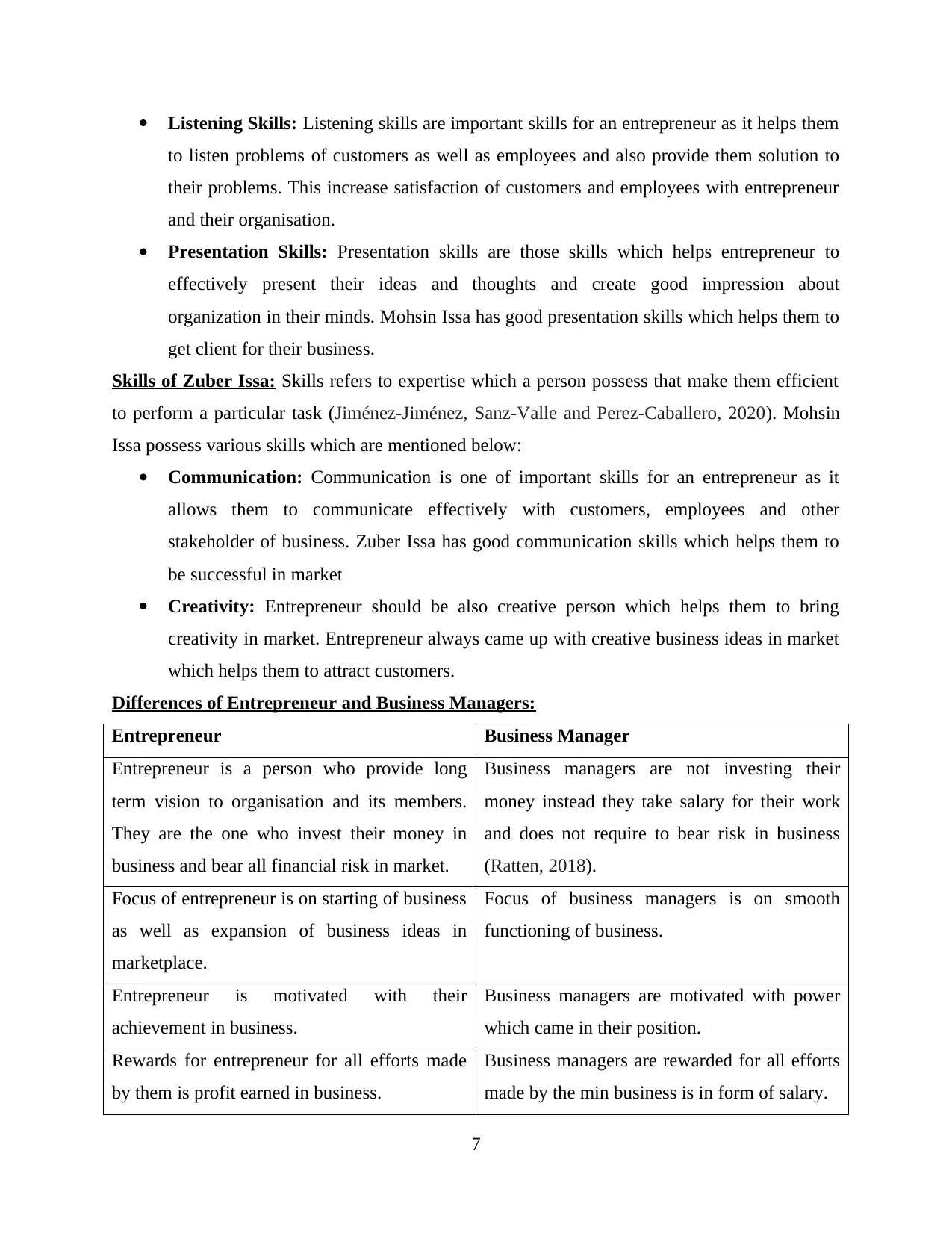
Listening Skills: Listening skills are important skills for an entrepreneur as it helps them
to listen problems of customers as well as employees and also provide them solution to
their problems. This increase satisfaction of customers and employees with entrepreneur
and their organisation.
Presentation Skills: Presentation skills are those skills which helps entrepreneur to
effectively present their ideas and thoughts and create good impression about
organization in their minds. Mohsin Issa has good presentation skills which helps them to
get client for their business.
Skills of Zuber Issa: Skills refers to expertise which a person possess that make them efficient
to perform a particular task (Jiménez-Jiménez, Sanz-Valle and Perez-Caballero, 2020). Mohsin
Issa possess various skills which are mentioned below:
Communication: Communication is one of important skills for an entrepreneur as it
allows them to communicate effectively with customers, employees and other
stakeholder of business. Zuber Issa has good communication skills which helps them to
be successful in market
Creativity: Entrepreneur should be also creative person which helps them to bring
creativity in market. Entrepreneur always came up with creative business ideas in market
which helps them to attract customers.
Differences of Entrepreneur and Business Managers:
Entrepreneur Business Manager
Entrepreneur is a person who provide long
term vision to organisation and its members.
They are the one who invest their money in
business and bear all financial risk in market.
Business managers are not investing their
money instead they take salary for their work
and does not require to bear risk in business
(Ratten, 2018).
Focus of entrepreneur is on starting of business
as well as expansion of business ideas in
marketplace.
Focus of business managers is on smooth
functioning of business.
Entrepreneur is motivated with their
achievement in business.
Business managers are motivated with power
which came in their position.
Rewards for entrepreneur for all efforts made
by them is profit earned in business.
Business managers are rewarded for all efforts
made by the min business is in form of salary.
7
to listen problems of customers as well as employees and also provide them solution to
their problems. This increase satisfaction of customers and employees with entrepreneur
and their organisation.
Presentation Skills: Presentation skills are those skills which helps entrepreneur to
effectively present their ideas and thoughts and create good impression about
organization in their minds. Mohsin Issa has good presentation skills which helps them to
get client for their business.
Skills of Zuber Issa: Skills refers to expertise which a person possess that make them efficient
to perform a particular task (Jiménez-Jiménez, Sanz-Valle and Perez-Caballero, 2020). Mohsin
Issa possess various skills which are mentioned below:
Communication: Communication is one of important skills for an entrepreneur as it
allows them to communicate effectively with customers, employees and other
stakeholder of business. Zuber Issa has good communication skills which helps them to
be successful in market
Creativity: Entrepreneur should be also creative person which helps them to bring
creativity in market. Entrepreneur always came up with creative business ideas in market
which helps them to attract customers.
Differences of Entrepreneur and Business Managers:
Entrepreneur Business Manager
Entrepreneur is a person who provide long
term vision to organisation and its members.
They are the one who invest their money in
business and bear all financial risk in market.
Business managers are not investing their
money instead they take salary for their work
and does not require to bear risk in business
(Ratten, 2018).
Focus of entrepreneur is on starting of business
as well as expansion of business ideas in
marketplace.
Focus of business managers is on smooth
functioning of business.
Entrepreneur is motivated with their
achievement in business.
Business managers are motivated with power
which came in their position.
Rewards for entrepreneur for all efforts made
by them is profit earned in business.
Business managers are rewarded for all efforts
made by the min business is in form of salary.
7
Paraphrase This Document
Need a fresh take? Get an instant paraphrase of this document with our AI Paraphraser
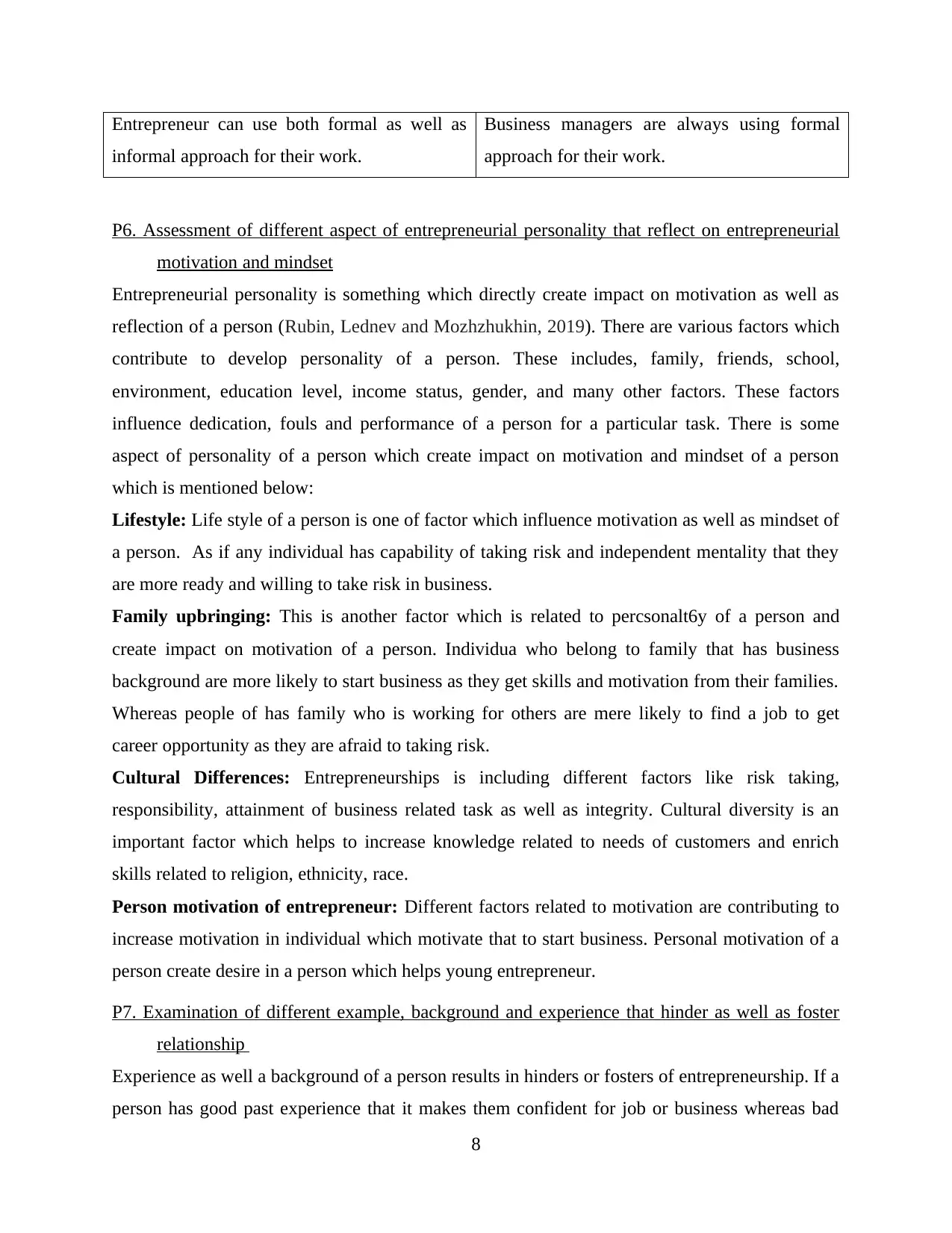
Entrepreneur can use both formal as well as
informal approach for their work.
Business managers are always using formal
approach for their work.
P6. Assessment of different aspect of entrepreneurial personality that reflect on entrepreneurial
motivation and mindset
Entrepreneurial personality is something which directly create impact on motivation as well as
reflection of a person (Rubin, Lednev and Mozhzhukhin, 2019). There are various factors which
contribute to develop personality of a person. These includes, family, friends, school,
environment, education level, income status, gender, and many other factors. These factors
influence dedication, fouls and performance of a person for a particular task. There is some
aspect of personality of a person which create impact on motivation and mindset of a person
which is mentioned below:
Lifestyle: Life style of a person is one of factor which influence motivation as well as mindset of
a person. As if any individual has capability of taking risk and independent mentality that they
are more ready and willing to take risk in business.
Family upbringing: This is another factor which is related to percsonalt6y of a person and
create impact on motivation of a person. Individua who belong to family that has business
background are more likely to start business as they get skills and motivation from their families.
Whereas people of has family who is working for others are mere likely to find a job to get
career opportunity as they are afraid to taking risk.
Cultural Differences: Entrepreneurships is including different factors like risk taking,
responsibility, attainment of business related task as well as integrity. Cultural diversity is an
important factor which helps to increase knowledge related to needs of customers and enrich
skills related to religion, ethnicity, race.
Person motivation of entrepreneur: Different factors related to motivation are contributing to
increase motivation in individual which motivate that to start business. Personal motivation of a
person create desire in a person which helps young entrepreneur.
P7. Examination of different example, background and experience that hinder as well as foster
relationship
Experience as well a background of a person results in hinders or fosters of entrepreneurship. If a
person has good past experience that it makes them confident for job or business whereas bad
8
informal approach for their work.
Business managers are always using formal
approach for their work.
P6. Assessment of different aspect of entrepreneurial personality that reflect on entrepreneurial
motivation and mindset
Entrepreneurial personality is something which directly create impact on motivation as well as
reflection of a person (Rubin, Lednev and Mozhzhukhin, 2019). There are various factors which
contribute to develop personality of a person. These includes, family, friends, school,
environment, education level, income status, gender, and many other factors. These factors
influence dedication, fouls and performance of a person for a particular task. There is some
aspect of personality of a person which create impact on motivation and mindset of a person
which is mentioned below:
Lifestyle: Life style of a person is one of factor which influence motivation as well as mindset of
a person. As if any individual has capability of taking risk and independent mentality that they
are more ready and willing to take risk in business.
Family upbringing: This is another factor which is related to percsonalt6y of a person and
create impact on motivation of a person. Individua who belong to family that has business
background are more likely to start business as they get skills and motivation from their families.
Whereas people of has family who is working for others are mere likely to find a job to get
career opportunity as they are afraid to taking risk.
Cultural Differences: Entrepreneurships is including different factors like risk taking,
responsibility, attainment of business related task as well as integrity. Cultural diversity is an
important factor which helps to increase knowledge related to needs of customers and enrich
skills related to religion, ethnicity, race.
Person motivation of entrepreneur: Different factors related to motivation are contributing to
increase motivation in individual which motivate that to start business. Personal motivation of a
person create desire in a person which helps young entrepreneur.
P7. Examination of different example, background and experience that hinder as well as foster
relationship
Experience as well a background of a person results in hinders or fosters of entrepreneurship. If a
person has good past experience that it makes them confident for job or business whereas bad
8
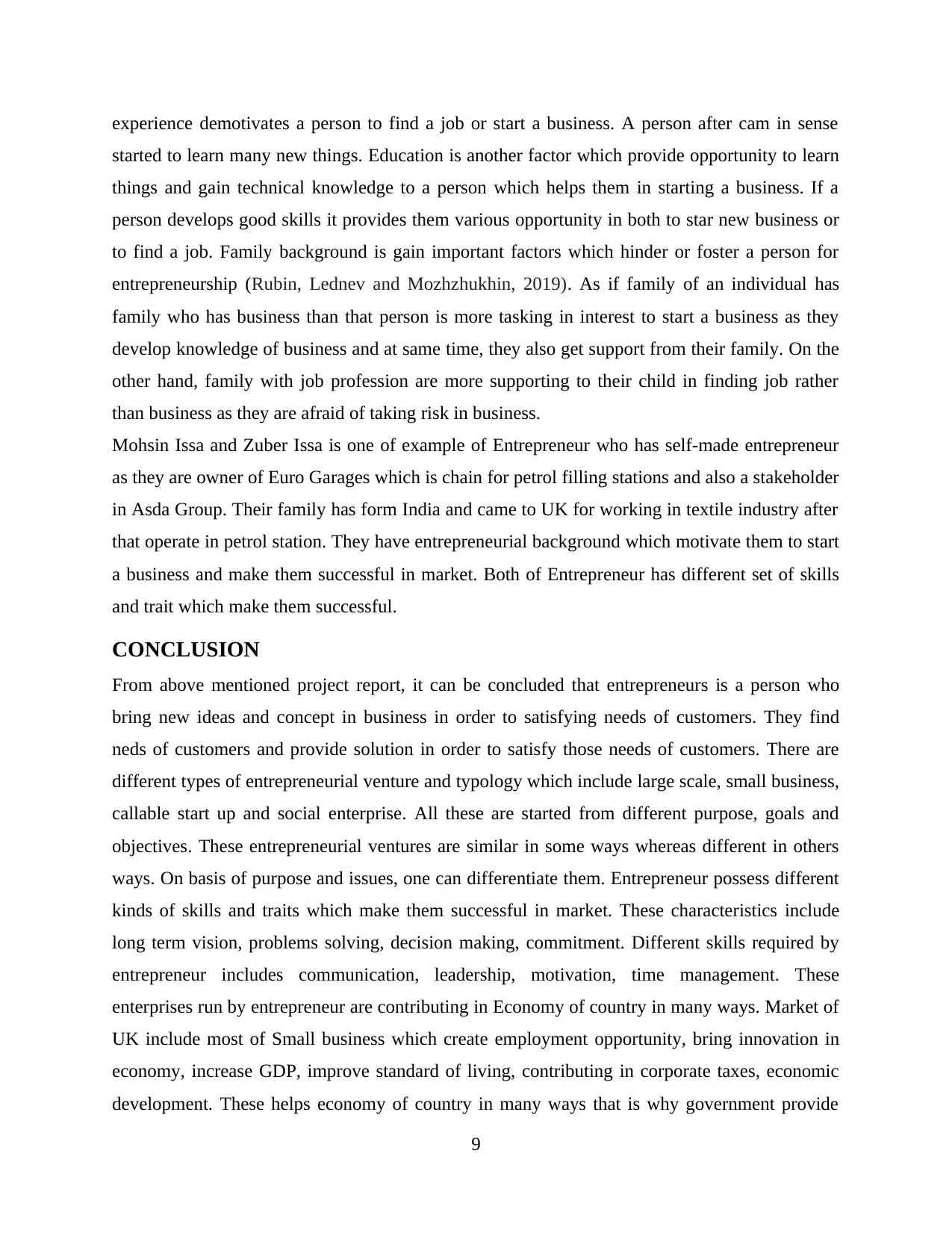
experience demotivates a person to find a job or start a business. A person after cam in sense
started to learn many new things. Education is another factor which provide opportunity to learn
things and gain technical knowledge to a person which helps them in starting a business. If a
person develops good skills it provides them various opportunity in both to star new business or
to find a job. Family background is gain important factors which hinder or foster a person for
entrepreneurship (Rubin, Lednev and Mozhzhukhin, 2019). As if family of an individual has
family who has business than that person is more tasking in interest to start a business as they
develop knowledge of business and at same time, they also get support from their family. On the
other hand, family with job profession are more supporting to their child in finding job rather
than business as they are afraid of taking risk in business.
Mohsin Issa and Zuber Issa is one of example of Entrepreneur who has self-made entrepreneur
as they are owner of Euro Garages which is chain for petrol filling stations and also a stakeholder
in Asda Group. Their family has form India and came to UK for working in textile industry after
that operate in petrol station. They have entrepreneurial background which motivate them to start
a business and make them successful in market. Both of Entrepreneur has different set of skills
and trait which make them successful.
CONCLUSION
From above mentioned project report, it can be concluded that entrepreneurs is a person who
bring new ideas and concept in business in order to satisfying needs of customers. They find
neds of customers and provide solution in order to satisfy those needs of customers. There are
different types of entrepreneurial venture and typology which include large scale, small business,
callable start up and social enterprise. All these are started from different purpose, goals and
objectives. These entrepreneurial ventures are similar in some ways whereas different in others
ways. On basis of purpose and issues, one can differentiate them. Entrepreneur possess different
kinds of skills and traits which make them successful in market. These characteristics include
long term vision, problems solving, decision making, commitment. Different skills required by
entrepreneur includes communication, leadership, motivation, time management. These
enterprises run by entrepreneur are contributing in Economy of country in many ways. Market of
UK include most of Small business which create employment opportunity, bring innovation in
economy, increase GDP, improve standard of living, contributing in corporate taxes, economic
development. These helps economy of country in many ways that is why government provide
9
started to learn many new things. Education is another factor which provide opportunity to learn
things and gain technical knowledge to a person which helps them in starting a business. If a
person develops good skills it provides them various opportunity in both to star new business or
to find a job. Family background is gain important factors which hinder or foster a person for
entrepreneurship (Rubin, Lednev and Mozhzhukhin, 2019). As if family of an individual has
family who has business than that person is more tasking in interest to start a business as they
develop knowledge of business and at same time, they also get support from their family. On the
other hand, family with job profession are more supporting to their child in finding job rather
than business as they are afraid of taking risk in business.
Mohsin Issa and Zuber Issa is one of example of Entrepreneur who has self-made entrepreneur
as they are owner of Euro Garages which is chain for petrol filling stations and also a stakeholder
in Asda Group. Their family has form India and came to UK for working in textile industry after
that operate in petrol station. They have entrepreneurial background which motivate them to start
a business and make them successful in market. Both of Entrepreneur has different set of skills
and trait which make them successful.
CONCLUSION
From above mentioned project report, it can be concluded that entrepreneurs is a person who
bring new ideas and concept in business in order to satisfying needs of customers. They find
neds of customers and provide solution in order to satisfy those needs of customers. There are
different types of entrepreneurial venture and typology which include large scale, small business,
callable start up and social enterprise. All these are started from different purpose, goals and
objectives. These entrepreneurial ventures are similar in some ways whereas different in others
ways. On basis of purpose and issues, one can differentiate them. Entrepreneur possess different
kinds of skills and traits which make them successful in market. These characteristics include
long term vision, problems solving, decision making, commitment. Different skills required by
entrepreneur includes communication, leadership, motivation, time management. These
enterprises run by entrepreneur are contributing in Economy of country in many ways. Market of
UK include most of Small business which create employment opportunity, bring innovation in
economy, increase GDP, improve standard of living, contributing in corporate taxes, economic
development. These helps economy of country in many ways that is why government provide
9
⊘ This is a preview!⊘
Do you want full access?
Subscribe today to unlock all pages.

Trusted by 1+ million students worldwide
1 out of 14
Related Documents
Your All-in-One AI-Powered Toolkit for Academic Success.
+13062052269
info@desklib.com
Available 24*7 on WhatsApp / Email
![[object Object]](/_next/static/media/star-bottom.7253800d.svg)
Unlock your academic potential
Copyright © 2020–2026 A2Z Services. All Rights Reserved. Developed and managed by ZUCOL.




